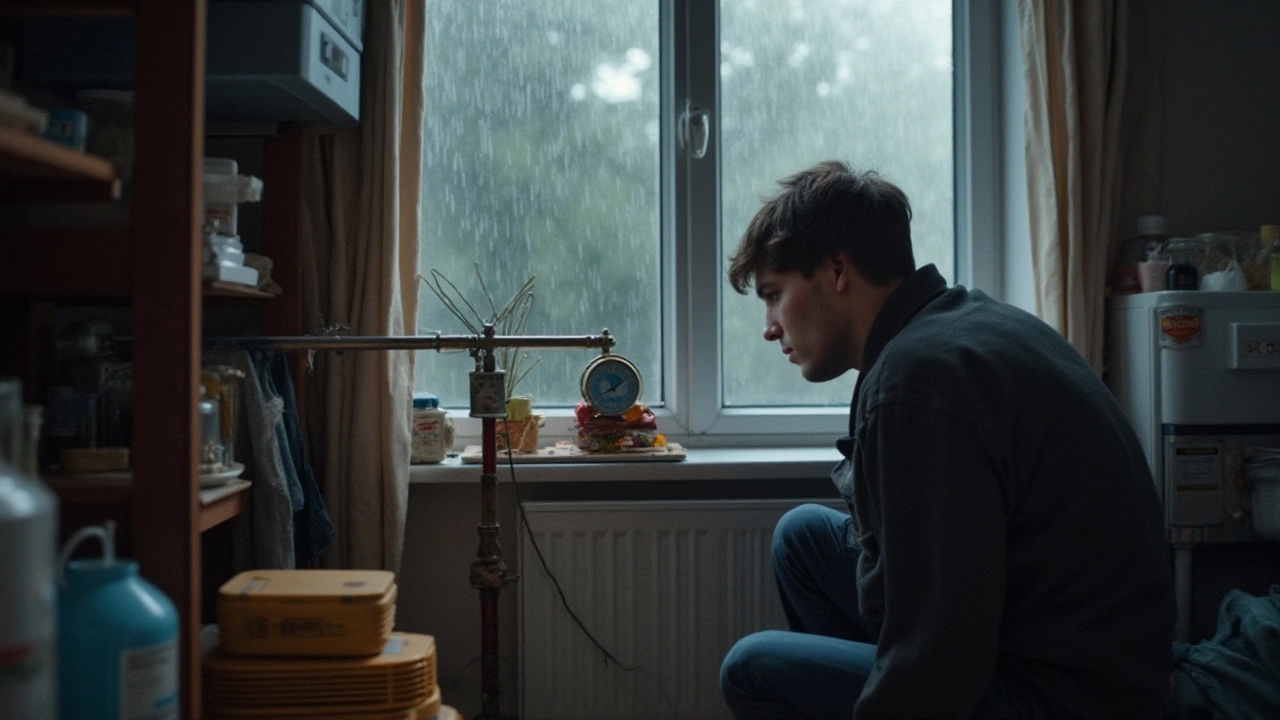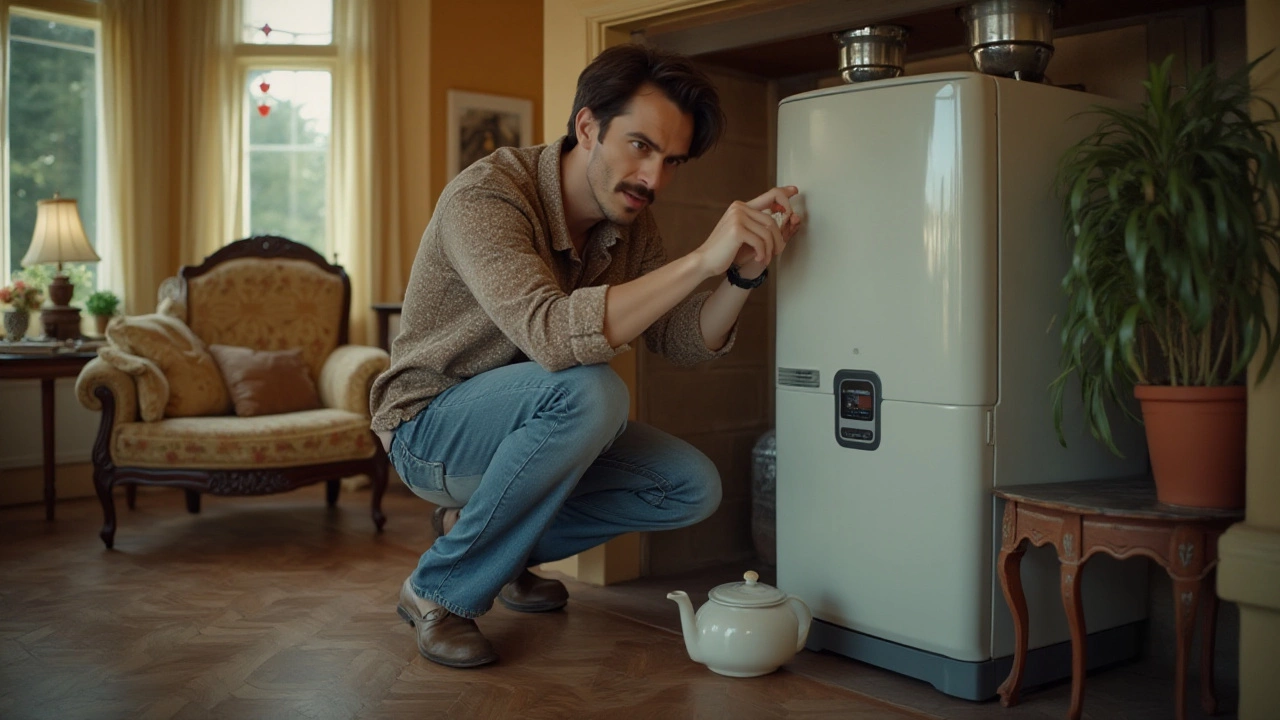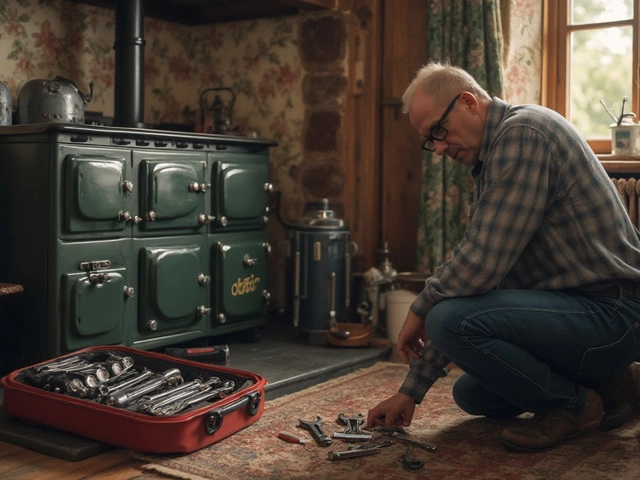Your boiler is a crucial part of keeping your home warm and cozy. But what happens when it starts acting up? Knowing the telltale signs of a broken boiler can ward off chilly surprises and costly repairs.
Have you noticed your heating isn't as effective as it used to be, or perhaps there's an unsettling rattle when the boiler kicks in? These could be indicators of underlying issues needing your attention.
Strange noises, inconsistent heating, and even odorous smells often betray a malfunctioning system. Before diving into household manuals or making frantic calls for help, you can perform a few simple checks yourself.
- Common Signs of a Faulty Boiler
- Why is My Boiler Making Strange Noises?
- The Importance of Regular Maintenance
- DIY Tips vs Professional Service
Common Signs of a Faulty Boiler
When your boiler, which is the powerhouse of your home's heating system, begins to show signs of wear and tear, it rarely goes unnoticed. One of the most obvious signs is the peculiar noises it might start making, ranging from banging to whistling. These sounds could mean debris is stuck in the pipes or the boiler is overheating. Understanding these noises can prevent more severe problems later on. Imagine a quiet evening at home when suddenly, your serenity is disrupted by a clattering and hissing emanating from the boiler. Believe it or not, these can be its cries for help, indicating sediment buildup or kettling issues.
A broken boiler has other signals to watch for, like irregular heat distribution. If some radiators are cold while others are warm, there could be an issue with the circulation of hot water caused by a faulty pump. This irregularity often goes unnoticed until a particularly cold snap. Another symptom includes a drop in hot water output, which can start as a minor inconvenience but may rapidly worsen. Don't ignore it if you're constantly fiddling with the dials to coax the boiler into providing adequate warmth.
Leaking could also hint at a malfunction. Water pooling around the unit or persistent dampness might stem from broken seals, corroded pipes, or pressure valve issues. Statistics from the Heating and Maintenance Association show that over 20% of boiler breakdowns are due to leaks. Addressing leaks promptly not only restores function but also prevents damage to your property. Take heed, as when left unattended, these leaks grow into larger, more expensive problems.
Boiler's pilot light going out repeatedly is another red flag. It's essential to note the color of the flame too; a blue flame indicates a healthy state, whereas yellow or orange could hint at carbon monoxide leakage, a potentially deadly issue. Here's a piece of advice: always have a carbon monoxide detector installed. Remember, approximately 4,000 cases of carbon monoxide poisoning are recorded yearly in the UK due to faulty boilers.
"A boiler working properly is a boiler that goes unnoticed. Any significant changes in its performance warrant immediate attention." - The Boiler Efficiency Institute
Moreover, pay attention to the boiler pressure gauge. Ideally, a healthy boiler operates between 1 and 2 bars. If your gauge reads outside this range, it could indicate potential problems with the pressure relief valve or expansion vessel. Both are integral to maintaining proper boiler functioning and often are the culprit behind many pressure-related issues. Regular maintenance can often catch pressure issues early, saving you the trouble of a cold shower when you least expect it.

Why is My Boiler Making Strange Noises?
Boilers are designed to perform their duties quietly in the background, but sometimes they decide to speak up. If your boiler has started making strange noises, it might be trying to tell you something important. For many homeowners, these sounds can be unsettling, potentially signaling a problem that needs addressing. Understanding the types of noises your boiler might make and what they potentially indicate can save you from unexpected breakdowns and expensive repair costs.
One of the common sounds you might hear is a banging or clunking noise, often referred to as "kettling." This usually occurs when there's a buildup of limescale or sludge on the heat exchanger, restricting water flow and causing the water to overheat and boil, much like a tea kettle. This can not only reduce the efficiency of your boiler but also increase the risk of damage over time. It’s a common issue in areas with hard water and might necessitate a chemical flush to remove the deposits or a power flush if the buildup is substantial.
Understanding Humming or Whirring Sounds
If you hear a constant humming or whirring, this might be less of a cause for immediate concern but an indicator of a different issue. Usually, this is related to the pump or fan within the boiler working harder than it should. This can occur if the pump is set too high or if it’s struggling against blockages elsewhere in the system. While it may not initially affect your heating, a strained component can lead to bigger problems down the line. Ensuring the settings are correct and that the system is clear might require a professional to diagnose and adjust as necessary.
"Regular maintenance is key to preventing unusual noises and ensuring the longevity of your heating system," says a leading boiler engineer from Heating Systems Today.
Other noises, such as gurgling or trickling sounds, often point to trapped air within the system or low water pressure. This can usually be resolved by bleeding your radiators and ensuring that your system's pressure is within the recommended range, typically around 1 to 2 bars. If these noises persist, it could suggest a deeper problem within the boiler’s mechanics, such as issues with the expansion tank or air being drawn in through a leak in the system.
While some noises are benign and merely indicate the system working hard during cold spells, persistent or concerning sounds shouldn’t be ignored. Identifying and addressing these issues early on can prevent more serious damage and ensure your home remains warm consistently. Whether it's a DIY check or calling in a professional, staying vigilant can keep your boiler running smoothly.

The Importance of Regular Maintenance
Regular maintenance of your boiler is not just a recommendation—it's a necessity if you want to ensure its longevity and efficiency. Regular check-ups can often prevent minor issues from escalating into major repairs. Many homeowners underestimate the impact of neglecting routine upkeep, only to face inconvenient and costly breakdowns down the line. By scheduling a yearly inspection, you help ensure all components of your boiler are functioning properly, keeping your home warm with minimal disruption. A well-maintained boiler means less stress during the peak of winter when its failure would cause the most inconvenience. Maintenance can also contribute to reduced energy bills, as a clean and efficiently running boiler uses less fuel.
An often-overlooked benefit of regular boiler maintenance is safety. Boilers can be potentially hazardous, and keeping them in good condition helps mitigate risks like gas leaks. Poorly maintained boilers might produce dangerous carbon monoxide, an odorless gas that can be lethal. To add a layer of reassurance, carbon monoxide detectors should also be installed in your home. Routine maintenance can catch these dangers before they become life-threatening events. A simple annual appointment can literally be life-saving, ensuring all safety features are functioning correctly.
"A yearly boiler inspection is a small investment with big potential returns—in safety, savings, and peace of mind." - Home Safety Experts
Maintenance brings with it another crucial advantage: protecting your warranty. Many boiler manufacturers require proof of annual maintenance to uphold their warranties. Failing to abide by these conditions might mean footing the bill for repairs out of your pocket when things go wrong. Thus, maintaining records of all services performed is good practice.
A fascinating statistic from the Energy Saving Trust suggests that efficient boilers can save you hundreds on your annual heating bills. Imagine investing in a higher standard of living simply by maintaining what you already have. When a boiler is not bogged down by sediment build-up and mineral deposits that impede its performance, you'll witness a home that's warm faster and maintains temperature better. Equipped with this knowledge, you can face winter with confidence, knowing your boiler is an asset rather than a liability. If you've not had a service yet this year, consider it an opportunity to ensure the safe and efficient function of your heating system.

DIY Tips vs Professional Service
When it comes to maintaining your broken boiler or fixing a simple malfunction, it’s tempting to roll up your sleeves and dive into some DIY action. While many homeowners prefer this approach, mainly because it seems cost-effective, it’s important to weigh the risks and benefits first. To begin with, not all issues are created equal. Sometimes, what appears to be a small problem can, in fact, be a symptom of a larger systemic issue. Before you start tweaking things, always make sure you have a clear understanding of what the problem might entail and assess whether it’s within your capability to fix.
When tackling a DIY repair on your boiler, here are a few guidelines to follow. First, consult your boiler’s user manual. Familiarity with the model and parts is crucial, as it will help you avoid damaging sensitive areas. For instance, if the issue lies within the boiler's pressure, checking the pressure gauge is a relatively straightforward task. Make sure the system is completely cooled down before you start. Adjust the pressure accordingly by following the instructions in the manual. Remember, if the pressure continues to lower or disrupt after adjustments, it’s time to call in a pro.
In contrast, opting for a professional boiler repair service brings expertise and safety assurances. Professional technicians not only carry the right tools for diagnostics and repairs but are also trained to spot hidden issues that might elude a less experienced eye. "A boiler is a complex system," notes Mark J. from the National Heating Association,
"While DIY can be applicable to basic maintenance, actual repair requires the touch of an expert."This is not an overstatement. For example, intricate problems such as gas supply issues, wiring faults, or serious component failures demand professional intervention to ensure safety and proper functioning.
Moreover, considering the long-term benefits of proper upkeep, hiring a professional can save you from costly repairs down the road. Boiler systems typically last between 10 to 15 years, and regular maintenance could stretch this window. Professional servicing involves a thorough inspection and service follow-up that could identify and fix potential breakdowns before they escalate. Many service providers offer packages or annual checks that ensure your system works optimally, giving you peace of mind.
It’s worth acknowledging that while DIY fixes can be rewarding, they can also void warranties if not handled correctly. Boilers, especially newer models, often come with comprehensive warranties that require servicing by authorized technicians only. Missteps in DIY repairs also risk personal safety. Any mishandling of boilers, known to deal with gas and high-pressure steam, can have serious implications.
Finally, making an informed decision about DIY versus professional service involves evaluating your comfort level with the task, the complexity of the issue at hand, and your boiler warranty terms. Remember, whether you take the DIY route or call a professional, the goal remains the same: maintaining a warm, safe, and efficient home environment.





